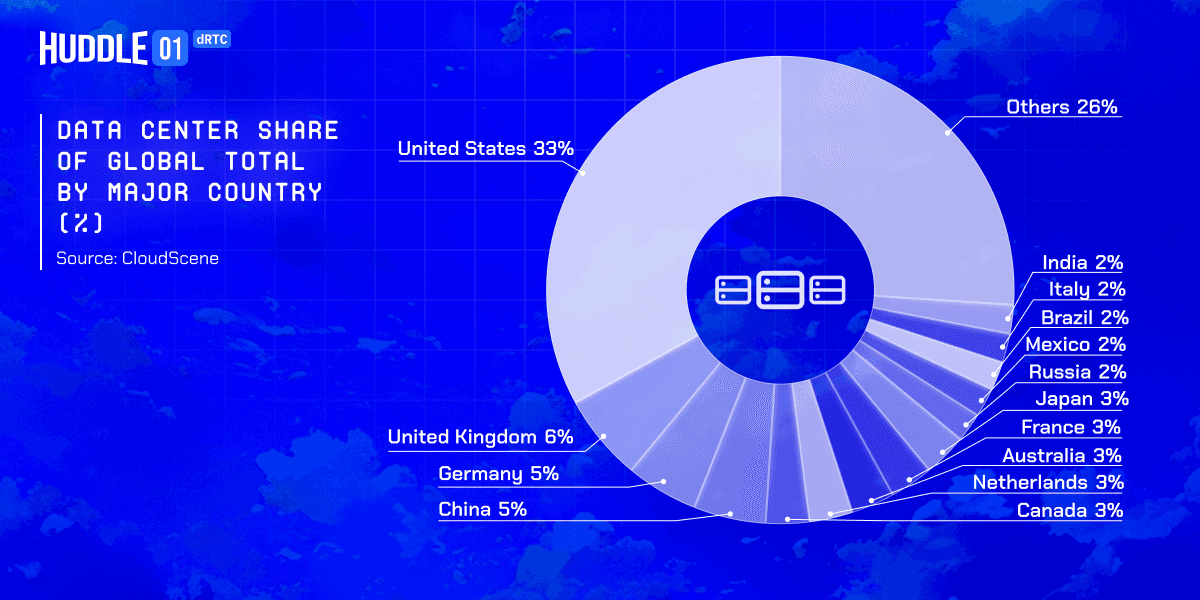Why Huddle01?
Huddle01 revolutionizes decentralized RTC infrastructure by overcoming the limitations of traditional centralised platforms. Here's why it stands out:
Why Huddle01?
Huddle01 revolutionizes decentralized RTC infrastructure by overcoming the limitations of traditional centralised platforms. Here's why it stands out:
Why Huddle01?
Huddle01 revolutionizes decentralized RTC infrastructure by overcoming the limitations of traditional centralised platforms. Here's why it stands out:
Why Huddle01?
Huddle01 revolutionizes decentralized RTC infrastructure by overcoming the limitations of traditional centralised platforms. Here's why it stands out:
95% Cheaper than AWS
Processing audio/video calls via Huddle01’s Media Nodes is significantly cheaper than major public clouds like AWS, Google Cloud Provider or buying your servers. This creates space for open innovation, and greatly affects enterprises and startups who are trying to innovate at bootstrap stage.
95% Cheaper than AWS
Processing audio/video calls via Huddle01’s Media Nodes is significantly cheaper than major public clouds like AWS, Google Cloud Provider or buying your servers. This creates space for open innovation, and greatly affects enterprises and startups who are trying to innovate at bootstrap stage.
95% Cheaper than AWS
Processing audio/video calls via Huddle01’s Media Nodes is significantly cheaper than major public clouds like AWS, Google Cloud Provider or buying your servers. This creates space for open innovation, and greatly affects enterprises and startups who are trying to innovate at bootstrap stage.
95% Cheaper than AWS
Processing audio/video calls via Huddle01’s Media Nodes is significantly cheaper than major public clouds like AWS, Google Cloud Provider or buying your servers. This creates space for open innovation, and greatly affects enterprises and startups who are trying to innovate at bootstrap stage.
New $HUDL Economy
Value generated via the network is routed back to the people - node operators, delegators, orchestrators, stakers and users, instead of legacy players like Google, Amazon and others.
New $HUDL Economy
Value generated via the network is routed back to the people - node operators, delegators, orchestrators, stakers and users, instead of legacy players like Google, Amazon and others.
New $HUDL Economy
Value generated via the network is routed back to the people - node operators, delegators, orchestrators, stakers and users, instead of legacy players like Google, Amazon and others.
New $HUDL Economy
Value generated via the network is routed back to the people - node operators, delegators, orchestrators, stakers and users, instead of legacy players like Google, Amazon and others.
<100ms Global Connectivity
Hyper-localized or distributed global infrastructure helps handle high traffic, improves accessibility in low network areas & eliminates single point of failure. Right now more 30% of the data centres are located in the US region, leading to high latency in developing nations - we call it the Data centre disparity.
<100ms Global Connectivity
Hyper-localized or distributed global infrastructure helps handle high traffic, improves accessibility in low network areas & eliminates single point of failure. Right now more 30% of the data centres are located in the US region, leading to high latency in developing nations - we call it the Data centre disparity.
<100ms Global Connectivity
Hyper-localized or distributed global infrastructure helps handle high traffic, improves accessibility in low network areas & eliminates single point of failure. Right now more 30% of the data centres are located in the US region, leading to high latency in developing nations - we call it the Data centre disparity.
<100ms Global Connectivity
Hyper-localized or distributed global infrastructure helps handle high traffic, improves accessibility in low network areas & eliminates single point of failure. Right now more 30% of the data centres are located in the US region, leading to high latency in developing nations - we call it the Data centre disparity.




Censorship Resistant
Enhanced security against data tracking, harvesting and censorship via cryptographic protocols.
Censorship Resistant
Enhanced security against data tracking, harvesting and censorship via cryptographic protocols.
Censorship Resistant
Enhanced security against data tracking, harvesting and censorship via cryptographic protocols.
Censorship Resistant
Enhanced security against data tracking, harvesting and censorship via cryptographic protocols.
Open Ownership
Node operators get to own and operate a part of the network and become a supplier of bandwidth on the network, and earn $HUDL Rewards.
Open Ownership
Node operators get to own and operate a part of the network and become a supplier of bandwidth on the network, and earn $HUDL Rewards.
Open Ownership
Node operators get to own and operate a part of the network and become a supplier of bandwidth on the network, and earn $HUDL Rewards.
Open Ownership
Node operators get to own and operate a part of the network and become a supplier of bandwidth on the network, and earn $HUDL Rewards.
Bootstrapping RTC innovation
Not much innovation has happened in the RTC space since Skype and Zoom came. It’s been 2 decades and we’re still talking to 2D screens. dRTC hyperlocalizes the RTC infrastructure for improved latency and brings down the infra cost by 95% creating the right landscape for open innovation
Bootstrapping RTC innovation
Not much innovation has happened in the RTC space since Skype and Zoom came. It’s been 2 decades and we’re still talking to 2D screens. dRTC hyperlocalizes the RTC infrastructure for improved latency and brings down the infra cost by 95% creating the right landscape for open innovation
Bootstrapping RTC innovation
Not much innovation has happened in the RTC space since Skype and Zoom came. It’s been 2 decades and we’re still talking to 2D screens. dRTC hyperlocalizes the RTC infrastructure for improved latency and brings down the infra cost by 95% creating the right landscape for open innovation
Bootstrapping RTC innovation
Not much innovation has happened in the RTC space since Skype and Zoom came. It’s been 2 decades and we’re still talking to 2D screens. dRTC hyperlocalizes the RTC infrastructure for improved latency and brings down the infra cost by 95% creating the right landscape for open innovation

